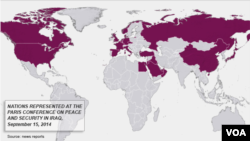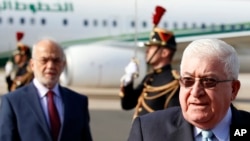ເກືອບ 30 ປະເທດໃຫ້ຄຳໝັ້ນສັນຍາວ່າ ຈະປະສານງານກັນໃນ
ການຕໍ່ສູ້ຕ້ານພວກຫົວຮຸນແຮງລັດອິສລາມຢູ່ໃນອີຣັກ. ການໃຫ້
ຄຳໝັ້ນສັນຍາ ຂອງເຂົາເຈົ້າ ທີ່ຈະຊ່ອຍລັດຖະບານອີຣັກ ໄດ້ມີ
ຂຶ້ນ ໃນລະຫວ່າງກອງປະຊຸມ ທີ່ນະຄອນປາຣີ ບ່ອນທີ່ລັດຖະມົນ
ຕີການຕ່າງປະເທດສະຫະລັດທ່ານ John Kerry ພວມເຮັດວຽກ
ຢ່າງໜັກເພື່ອສ້າງຕັ້ງແນວໂຮມໃນຂອບເຂດທີ່ກວ້າງຂວາງ. ຜູ້ສື່
ຂ່າວວີໂອເອ Scott Stearns ມີລາຍງານກ່ຽວກັບເລື່ອງນີ້ຈາກ
ປາຣີ ດັ່ງໄພສານຈະນຳເອົາລາຍລະອຽດມາສະເໜີທ່ານ ໃນອັນ
ດັບຕໍ່ໄປ.
ໃນການສູ້ລົບ ຕ້ານພວກຫົວຮຸນແຮງລັດອິສລາມ ມາຮອດປັດ
ຈຸບັນນີ້ມີແຕ່ກຳລັງສະຫະລັດແລະອີຣັກເທົ່ານັ້ນ ປະກອບສ່ວນເຂົ້າຮ່ວມເພື່ອຂັບໄລ່ພວກ
ເຂົາ ໃຫ້ກັບຄືນເຂົ້າໄປໃນເຂດແດນຊີເຣຍ.
ປະທານາທິບໍດີອີຣັກທ່ານ Fouad Massoum ກ່າວວ່າ ການສູ້ລົບແມ່ນຈຳເປັນຈະຕ້ອງ ໄດ້ຂະຫຍາຍໃຫຍ່ກວ່ານີ້ ແລະຢູ່ໃນຂອບເຂດກວ້າງຂວາງກວ່ານີ້.
ທ່ານ Massoum ເວົ້າວ່າ “ພວກເຮົາຕ້ອງໄດ້ຕິດຕາມເຂົາໄປ ບໍ່ວ່າພວກເຂົາຈະໄປ
ໃສ. ພວກເຮົາຕ້ອງໄດ້ຕັດການສົ່ງເງິນສະໜັບສະໜຸນໃຫ້ແກ່ພວກເຂົາ. ພວກເຮົາ ຕ້ອງໄດ້ປິດລ້ອມພວກເຂົາດ້ວຍກົດໝາຍທີ່ຫ້າມບໍ່ໃຫ້ຜູ້ຄົນເຮັດວຽກຮ່ວມກັບພວກ ເຂົາ ພວກເຮົາຕ້ອງໄດ້ນຳເອົາພວກເຂົາ ມາລົງໂທດ ແລະພວກເຮົາຕ້ອງໄດ້ຍຸດຕິ ບໍ່ໃຫ້ພວກນັກລົບ ຢູ່ໃນປະເທດໃກ້ຄຽງ ໄປຮ່ວມສົມທົບກັບພວກເຂົາ.”
ສ່ວນປະທານາທິບໍດີຝຣັ່ງທ່ານ Francois Hollande ກ່າວວ່າ
ການຂົ່ມຂູ່ຂອງພວກຫົວຮຸນແຮງລັດອິສລາມບໍ່ແມ່ນການຂົ່ມຂູ່
ທີ່ປະຊາຄົມນາໆຊາດ ຄວນຈະມອງຂ້າມ.
ທ່ານ Hollande ເວົ້າວ່າ “ພວກເຮົາ ຕ້ອງໄດ້ດຳເນີນງານ
ຮ່ວມກັນ. ພວກເຮົາຕ້ອງໄດ້ໃຫ້ການສະໜັບສະໜຸນແກ່
ເຈົ້າໜ້າທີ່ອີຣັກ ຢ່າງຈະແຈ້ງ ໝັ້ນຄົງ ແລະຢ່າງເຂັ້ມແຂງ ແລະບໍ່ໃຫ້ສູນເສຍເວລາ ແມ່ນແຕ່ໜ້ອຍດຽວ.”
ລັດຖະມົນຕີການຕ່າງປະເທດສະຫະລັດ ທ່ານ John Kerry
ໄດ້ໄປຮ່ວມກອງປະຊຸມທີ່ປາຣີ ຫລັງຈາກໄດ້ມີການປະຊຸມຢູ່ທີ່ປະເທດອີຣັກ ຈໍແດັນ ຊາອຸ
ດີ ອາຣາເບຍ ເທີກີ ແລະອີຈິບເພື່ອພະຍາຍາມຊັກຊວນໃຫ້ພວກຜູ້ນຳອາຣັບຕ້ານກຸ່ມລັດ ອິສລາມ ທີ່ຮູ້ກັນໃນອີກ ຊື່ນຶ່ງວ່າ ISIS ນັ້ນ. ເຈົ້າໜ້າທີ່ສະຫະລັດກ່າວວ່າ ມັນມີຄວາມສຳ ຄັນເປັນພິເສດ ທີ່ຈະຕ້ອງມີພັນທະມິດມຸສລິມ ມາຊ່ວຍບ່ອນທຳລາຍ ຫລັກອຸດົມການຮຸນ ແຮງຈັດຂອງພວກລັດອິສລາມນັ້ນ. ທ່ານນາງ Nora Bensahel ອາຈານສອນທີ່ມະຫາວິ ທະຍາໄລ Georgetown ກ່າວວ່າ ອຸດົມການນີ້ ເປັນໄພຂົ່ມຂູ່ຕໍ່ຂົງເຂດ.
ທ່ານນາງ Bensahel ເວົ້າວ່າ “ບັນດາປະເທດສ່ວນໃຫຍ່ ຢູ່ໃນຂົງເຂດ ບໍ່ວ່າພວກ ເຂົາຈະນັບຖືສາສະໜາອິສລາມນິກາຍຊຸນນີ່ຫຼືນິກາຍຊີໄອທ໌. ເປັນພັນທະມິດຫຼື ສັດຕູຂອງສະຫະລັດຫລືແມ່ນຫຍັງກໍຕາມໃນທຳນອງນັ້ນ ຕ່າງກໍມີຜົນປະໂຫຍດ ໃນການຍຸດຕິກຸ່ມ ISIS ຍ້ອນວ່າ ມັນເປັນກຸ່ມທີ່ມີການຈັດຕັ້ງ ຢ່າງເຂັ້ມແຂງ ທີ່ ໂຫດຮ້າຍປ່າເຖື່ອນ ມີອຸດົມການທີ່ໂຫດຮ້າຍສຸດຂີດແມ່ນແຕ່ໂດຍມາດຕະຖານ ຂອງຂົງເຂດ.”
ທ່ານ Steve Haydemann ນັກວິເຄາະປະຈຳສະຖາບັນສັນຕິພາບຂອງສະຫະລັດກ່າວ ວ່າພວກຫົວຮຸນແຮງລັດອິສລາມຍັງເປັນໄພຂົ່ມຂູ່ຕໍ່ຊີເຣຍແລະບັນດາປະເທດພັນທະມິດ ຄືຣັດເຊຍແລະອີຣ່ານ ທີ່ໄດ້ໃຫ້ການສະໜັບສະໜຸນ ຕໍ່ກຸ່ມດັ່ງກ່າວ ເພື່ອເປັນແຮງຖ່ວງ ຕໍ່ ພວກຝ່າຍຄ້ານທີ່ນິຍົມແນວທາງປານກາງນັ້ນ.
ທ່ານ Heydemann ເວົ້າວ່າ “ມັນເປັນອັນຕະລາຍຕໍ່ຄຳຖາມທາງດ້ານສິນທຳ ພວກ ເຂົາໄດ້ປະພຶດໂຕ ແບບຂີ້ຮ້າຍຫຼາຍ ແຕ່ພວກເຮົາ ອາດຈະທຳການພົວພັນ ພວກ ເຮົາຕ້ອງໄດ້ແຊກແຊງ ໃນທາງທີ່ໝາຍຄວາມວ່າ ພວກເຂົາຈະບໍ່ໄດ້ຮັບຄວາມທຸກ ທໍລະມານ ອັນເປັນຜົນທີ່ຕິດຕາມມາ ຈາກການປະພຶດທີ່ບໍ່ດີນັ້ນ.”
ການເຈລະຈາເຫຼົ່ານີ້ແມ່ນແນໃສ່ການສ້າງຕັ້ງແນວໂຮມເພື່ອປະເຊີນໜ້າກັບພວກຫົວຮຸນ ແຮງໃນອີຣັກບໍ່ແມ່ນໃນຊີເຣຍ ບ່ອນທີ່ພວກເຂົາ ມີຖານປະຕິບັດງານນັ້ນ. ທ່ານນາງ Sa-
rah Margon ຈາກກຸ່ມປົກປ້ອງສິດທິມະນຸດ Human Rights Watch ກ່າວວ່ານັ້ນແມ່ນ
ເປັນການຈັດການກັບພຽງແຕ່ສ່ວນນຶ່ງຂອງບັນຫາ.
ທ່ານນາງ Margon ເວົ້າວ່າ “ເພື່ອຈະດຳເນີນການຕໍ່ໄປ ການຕອບໂຕ້ໃດໆກໍຕາມ
ຕໍ່ສິ່ງທີ່ໄດ້ເກີດຂຶ້ນໃນອີຣັກນັ້ນ ແມ່ນຈະຕ້ອງຮວມເອົາຊີເຣຍນຳດ້ວຍ. ຖ້າບໍ່ດັ່ງ
ນັ້ນແລ້ວ ທ່ານກໍຈະເຫັນແຕ່ ການຖອຍອອກໄປ ຂອງກຸ່ມ ISIS ແລ້ວພວກເຂົາ
ກໍຈະສ້າງຄວາມເຂັ້ມແຂງຂຶ້ນຕື່ມແລະສືບຕໍ່ລະດົມກຳລັງຈາກຢູ່ອີກຟາກນຶ່ງຂອງ ຊາຍແດນ.”
ພວກຜູ້ນຳຂອງອີຣັກໄດ້ຮຽກຮ້ອງອີກຄັ້ງນຶ່ງໃຫ້ມີການໂຈມຕີທາງອາກາດຂ້າມຊາຍແດນ ເຂົ້າໄປໃນຊີເຣຍ ທີ່ເຈົ້າໜ້າທີ່ສະຫະລັດ ເວົ້າວ່າ ພວກພັນທະມິດ ໃນຢູໂຣບ ແລະອາຣັບ ຍັງມີຄວາມລັງໄລໃຈຢູ່ທີ່ຈະພິຈາລະນາ ດ້ວຍວ່າປະທານາທິບໍດີໂອບາມາໄດ້ປະກາດວ່າ ຈະທຳການໂຈມຕີພວກນັກລົບ ຂອງກຸ່ມລັດອິສລາມ ບໍ່ວ່າຢູ່ແຫ່ງຫົນໃດກໍຕາມນັ້ນ ພວກ ເຈົ້າໜ້າທີ່ສະຫະລັດ ເວົ້າວ່າ ເມື່ອເຖິງເວລາທຳການໂຈມຕີທາງອາກາດ ໃນຊີເຣຍແລ້ວ ເຂົາເຈົ້າກໍແມ່ນຈະມີເຫດຜົນທາງດ້ານກົດໝາຍກຽມໄວ້ພ້ອມສຳຫລັບເປັນຂໍ້ອ້າງສະໜັບ ສະໜຸນການກະທຳດັ່ງກ່າວ ຢູ່ໃນປະເທດອະທິປະໄຕໃດນຶ່ງທີ່ບໍ່ໄດ້ຮ້ອງຂໍໃຫ້ມີການແຊກ ແຊງທາງທະຫານ.
Nearly 30 countries have promised to coordinate in the fight against Islamic State militants in Iraq. Their pledge to help the Iraqi government came at a Paris meeting, where U.S. Secretary of State John Kerry worked to build a broad coalition. VOA State Department Correspondent Scott Stearns has the story from Paris.
In the fight against Islamic State militants, so far only U.S. and Iraqi forces are taking part in the push to drive them back toward the Syrian border.
Iraqi President Fouad Massoum says that fight needs to be bigger and broader.
"We must pursue them wherever they are. We must cut off their financing. We must besiege them with laws that forbid people to work with them, we must bring them to justice and we must stop the fighters in the neighboring countries joining them."
French President Francois Hollande says the Islamic State threat is not one the international community can ignore.
"We have to act together. We have to stand by the Iraqi authorities, clearly, loyally and strongly and there's not a moment to be lost."
U.S. Secretary of State John Kerry came to these talks after meetings in Iraq, Jordan, Saudi Arabia, Turkey, and Egypt -- trying to rally Arab leaders against the group, which is also known as ISIS. U.S. officials say it is especially important to have Muslim allies undermine its extremist Muslim ideology. Georgetown University professor Nora Bensahel says that ideology is a regional threat.
"Most of the states in the region, regardless of whether they're Sunni or Shia or U.S. allies or U.S. enemies or anything like that, do have an interest in stopping ISIS because it is such a well-organized group that has a brutal, brutal extremist ideology even by regional standards."
U.S. Institute of Peace analyst Steve Heydemann says the Islamic State also threatens Syria, and its allies, Russia and Iran, which encouraged the group as a counterweight to more moderate opponents.
"It's a moral hazard question. They behaved badly. But we may engage, we may intervene in ways that mean that they are not suffering the consequences of their bad behavior."
These talks focused on building a coalition to confront militants in Iraq, not in Syria where they are based. Human Rights Watch's Sarah Margon says that deals with only part of the problem.
"Going forward, any response to what's going on in Iraq has to include a Syria component. Otherwise you are just going to see ISIS retreat, harden, and continue to mobilize themselves from across the border."
"Iraqi leaders again called for airstrikes across the border in Syria, which U.S. officials say their European and Arab allies are far more reluctant to consider. With President Obama vowing to attack Islamic State fighters "wherever they are," U.S. officials say when it comes to Syrian airstrikes, they will have ready their legal justification for such action in a sovereign state that has not asked for that military intervention. Scott Stearns, VOA News, Paris."







